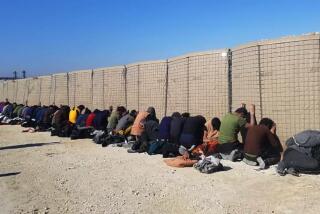Militants reportedly claim capture of Israeli-Canadian woman

- Share via
Reporting from Jerusalem — Mystery surrounds the whereabouts of an Israeli-Canadian woman who joined Kurdish forces battling the Islamic State in Syria, with unconfirmed reports saying she may have been captured by the terror group.
The governments of Canada and Israel were trying to obtain further information about the whereabouts of former Israeli soldier Gill Rosenberg, official statements from both said. According to the U.S.-based intelligence group SITE, a message on a known militant Internet forum claimed Islamic State had captured a “female Zionist soldier” in Kobane, Syria.
Militants reportedly debated online whether to trade the captive for female Muslim prisoners or execute her, but Kurdish sources dismissed the report as spurious propaganda.
Speculation swirled through Israeli media that Rosenberg was the woman being discussed.
However, according to a post on her Facebook page Monday, she is safe some 185 miles from Kobane and without Internet access. Two weeks ago, Rosenberg thanked friends for birthday wishes and wrote that someone else would be managing her page for several weeks. She is believed to be in training.
Besides her friends, few Israelis had heard about Gill Rosenberg until a month ago, when surprising media reports introduced her as the first Israeli and foreign woman to join Kurdish peshmerga fighters.
According to various reports, Rosenberg, 31, is a Canadian-born Jew who moved to Israel in the last decade after a short career as a civil aviator, reportedly with hopes of becoming an army pilot.
Rosenberg enlisted in Israel’s military, where she ended up serving in a rescue and recovery unit. Her new life was disrupted when she was arrested for allegedly participating in an international phone scam run by a dozen Israelis who swindled senior citizens, mostly in the United States, of about $25 million, according to a 2009 FBI release that named her as Gillian Rosenberg.
Extradited to the United States, she reportedly entered a plea bargain that included a prison term. After serving several months, she was released and, according to her Facebook page, recently returned to Israel.
Foreigners heading for the Syrian battle zone are often discreet about their plans and identities. American journalist Steven Sotloff attempted to conceal his Jewish identity during his work in the region, and friends and colleagues scrubbed the Internet of references to his Israeli citizenship after he was captured by militants, revealing it only after he was beheaded by Islamic State in September. Israeli aid workers involved in humanitarian efforts in Syria use aliases in media interviews, their faces blacked out in published photographs.
Despite the dangers, however, Rosenberg has shared her information freely.
Her Facebook page lists her as a resident of Tel Aviv and boasts a cover picture from the airport of Irbil, the capital of the Kurdish region of Iraq. Posts in early November detail her unusual journey from Israel through Jordan and Iraq to join the Kurdish fighters. Her move drew appreciation and camaraderie from Kurdish supporters and a mixture of admiration and concern from her Israeli friends.
Those concerns grew deeper with the latest claims of Islamic State capturing an Israeli.
“My heart sank to my stomach,” a friend of Rosenberg’s, Charlie Vardi, told the Hebrew news site Ynet, adding that he hoped the claims were false. For Islamic State to land a captive who is North American, Jewish and Israeli would be “like winning a prize, a gold medal,” he said.
Sobelman is a special correspondent.
More to Read
Sign up for Essential California
The most important California stories and recommendations in your inbox every morning.
You may occasionally receive promotional content from the Los Angeles Times.










